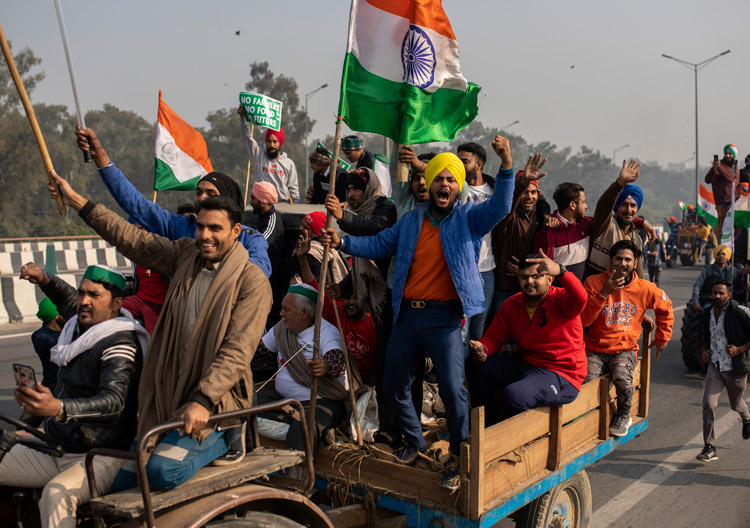NEW YORK — Hundreds of thousands of farmers on thousands of tractors, on horseback or on foot streamed into India’s capital, New Delhi, Jan. 26. The action was part of their monthslong protests demanding the overturn of new farm laws enacted by Prime Minister Narendra Modi that threaten their livelihoods.
The protest overshadowed the government’s Republic Day celebrations. And their show of strength was backed by solidarity actions elsewhere in India and around the world.
The laws — drawn up in the interests of large capitalist agricultural profiteers like Reliance Industries and Adani Enterprises — would eliminate government-subsidized crop price supports that benefit working farmers. Over 800 million people in India’s countryside rely on agriculture for a living.
Some farmers drove their tractors through police barricades to try to get to the heart of the capital. Thousands of others occupied the famous 17th century Red Fort. Riot police fired water cannons and tear gas at demonstrators. Cops used bamboo sticks to beat back angry farmers. One farmer died and many were wounded.
Most of the farmers came from nearby states — Punjab, Haryana, Uttar Pradesh, Rajasthan, Madhya Pradesh and Uttarakhand. Hundreds of women learned how to drive tractors for the mass protest. Indian women now run 12% of the country’s farms.
Hundreds of thousands of farmers and family members have camped on highways on the outskirts of New Delhi for two months. This is the biggest confrontation Modi’s Bharatiya Janata Party government has faced in its six years in office.
Solidarity protests around the world
Thousands of farmers marched into Mumbai, India’s largest city, Jan. 25 to stage a sit-in protest. “We are here to support farmers in Delhi, to highlight that farmers across the country are against the farm laws,” Ashok Dhawale, a protest leader, told the press.
Here in New York over 100 supporters of the farmers marched from Times Square to a rally outside the United Nations. A rally in Chicago drew 200.
Hundreds rallied in front of Indian consulates in Vancouver, British Columbia, and San Francisco. Protests took place in Seattle and Los Angeles. A car rally was organized in Auckland, New Zealand, after 300 had protested there nine days earlier under the banner, “Repeal anti-farmer laws!” In London, Montreal, and Ottawa, Ontario, actions were cancelled because of government COVID-19 restrictions on the right to protest.
“The Indian government calls farmers uneducated. But look at how over 30 farmer unions are collaborating,” Jasvir Kaur Singh from the Sikh Religious Society in Palatine, Illinois, told the Militant at the Chicago action. “I’ve never seen this level of organization — tents, security, entertainment, so much food that farmers are actually feeding the homeless in New Delhi.”
“My uncle has six acres,” said Gurpreet Singh. “This new bill takes away the minimum price farmers get. It will lead to a big consolidation of land.”
“They say with the new law you’ll be able to sell anywhere, but small farmers can’t,” Hardeep Singh added. “They don’t have the transportation or the storage, and will be forced to sell their land. The corporations are pushing the government to pass this law, so they can take over.”
“The unions are important,” Abinash Kaur told this reporter at the New York action. She described the solidarity action by millions of Indian workers, whose conditions and rights are also under attack.
“It’s a life-or-death question. Farmers will be devastated,” she added. “The suicide rates will get worse.” Over 16,000 farmers took their own lives in Punjab between 2000 and 2015, mostly over unpayable debts.
Farmers’ representatives rejected Modi’s recent offer to defer imposition of the laws for 18 months, demanding their complete revocation. The government rammed them through last September under cover of the pandemic, completely underestimating the strength of the farmers’ response.
Working farmers of Punjab, a majority Sikhs, and of Haryana, in India’s northern “breadbasket,” have somewhat larger, more productive, plots and more tractors than farmers elsewhere. They stand to lose more from the elimination of state-backed minimum prices and have led the widening rebellion.
Róger Calero, Socialist Workers Party’s candidate for mayor of New York, spoke at the rally here, bringing solidarity to the farmers’ struggle. He said they “are demonstrating that the only way working people can defend ourselves is by using our organized strength, not depending on capitalist politicians.
“The only way to get rid of the system of capitalist exploitation that robs workers and farmers of their livelihoods,” Calero said, “is to fight to bring to power our own workers and farmers government.”
Farmers’ unions have announced their next big action will be marches on India’s parliament Feb. 1, when the government presents its annual budget.
Naomi Crane in Chicago contributed to this article.


